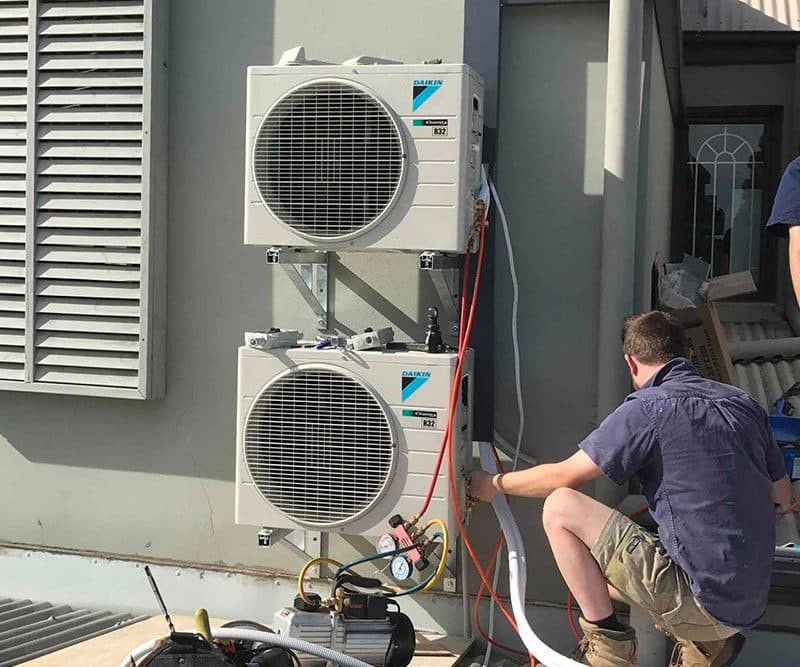HVAC systems play a crucial role in maintaining indoor comfort. However, they can often be a source of unwanted noise, causing disturbances and affecting the overall quality of the environment. This is where soundproofing comes into play. Soundproofing techniques help minimize noise levels produced by HVAC systems, making them quieter and more pleasant to be around
In discussing quiet HVAC installation, it’s crucial to ensure a seamless experience from start to finish. Partnering with ICE Air Conditioning and Plumbing can elevate your journey. Their exceptional HVAC services in Las Vegas, NV, promise top-notch expertise for a quieter, more efficient system. Furthermore, their commitment extends to providing the finest HVAC installation service in Henderson, NV, ensuring your peace and comfort through meticulous installations.
When considering the role of soundproofing in HVAC installation, a paramount aspect is the overall experience. ICE Air Conditioning and Plumbing excel in delivering an outstanding HVAC installation experience in North Las Vegas, NV. With their dedication to the best HVAC installation service in Spring Valley, NV, they prioritize noise reduction and efficient installations, ensuring a tranquil environment for your space.
In this blog post, we will explore the challenges of noise in HVAC systems, the benefits of soundproofing, different soundproofing techniques, factors to consider when soundproofing HVAC systems, and the importance of professional assistance in achieving a quiet HVAC installation.
The Challenges of Noise in HVAC Systems
Causes of Noise in HVAC Systems
HVAC systems generate noise during their operation due to various reasons. One of the primary sources of noise is the movement of air through the ductwork. When air flows through small gaps or obstructions, it can produce whooshing or whistling sounds. Other common causes of noise include fan motors, compressors, and airflow turbulence. Understanding the root causes of noise is essential in addressing them effectively through soundproofing techniques.
Effects of Noise Pollution from HVAC Systems
Noise pollution from HVAC systems can have several detrimental effects. It can disrupt concentration and productivity in workplaces, disturb sleep and relaxation in residential settings, and even cause health issues such as stress, anxiety, and sleep disorders. In addition, excessive noise can interfere with communication, making it difficult to hold conversations and transmit important information. Therefore, it is crucial to mitigate the impact of noise pollution from HVAC systems to ensure a quiet and healthy environment.
Safety Concerns of Noisy HVAC Systems
Noisy HVAC systems can also pose safety concerns. When HVAC systems generate excessive noise, it can mask other important sounds, such as alarms or warning signals. In emergency situations, the ability to hear these sounds can be crucial for prompt action and ensuring the safety of occupants. By minimizing noise through soundproofing techniques, the potential risks associated with the masking of important sounds can be significantly reduced.
Negative Impacts of Noise on HVAC System Performance
Noise can also negatively impact the performance of HVAC systems. Excessive noise can indicate mechanical issues or component wear, leading to reduced efficiency and potential system failures. The vibrations and reverberations caused by noise can further affect the integrity of system components, leading to premature wear and tear. By addressing noise issues through soundproofing, both the performance and lifespan of HVAC systems can be enhanced.
Regulations and Standards for Noise Levels in HVAC Systems
To ensure a quiet and comfortable environment, there are regulations and standards in place for noise levels in HVAC systems. These standards outline acceptable noise levels for different types of spaces and buildings. By complying with these standards, HVAC installations can meet the required noise criteria and maintain a peaceful environment. Soundproofing plays a crucial role in achieving compliance with these regulations and standards.
How Soundproofing Helps?
Soundproofing techniques help minimize the transmission of noise from HVAC systems, reducing their impact on the surrounding environment. By employing soundproofing measures, noise can be absorbed, isolated, or dampened, resulting in a quieter and more peaceful atmosphere. Soundproofing also helps improve the performance and efficiency of HVAC systems by reducing mechanical vibrations and minimizing wear and tear on components.
Types of Soundproofing Techniques
Acoustic Insulation
Acoustic insulation involves the use of materials that have excellent sound-absorbing properties. These materials are installed around HVAC components and ductwork to absorb and dampen noise. Commonly used insulation materials include foam panels, mineral wool, and acoustic wraps. Acoustic insulation helps prevent the transmission of sound through walls, floors, and ceilings, reducing noise levels in the surrounding areas.
Vibration Dampening
Vibration-dampening techniques are used to reduce the mechanical vibrations caused by HVAC systems, which can contribute to noise production. This can be achieved by installing rubber or neoprene mounts, and isolating the HVAC components from the surrounding structure. Vibration-dampening materials are also used for ductwork, reducing the transmission of vibrations and noise through the system.
Sound Absorption
Sound absorption techniques involve the use of materials that absorb sound waves, preventing them from reflecting and amplifying within the space. These materials are typically installed in the walls, ceilings, and floors surrounding the HVAC system. Common sound absorption materials include acoustic panels, fabric-wrapped panels, and perforated metal panels. Sound absorption helps in reducing overall noise levels and minimizing echoes and reverberations.
Enclosures and Barrier Walls
Enclosures and barrier walls are physical structures designed to contain and isolate the HVAC system, preventing noise from spreading to adjacent areas. These structures are typically made using materials with high sound transmission loss properties, such as mass-loaded vinyl or concrete. By creating a barrier between the noisy HVAC components and the surrounding space, enclosures and barrier walls effectively reduce noise pollution.
Duct Silencers and Sound Traps
Duct silencers and sound traps are specifically designed components that are installed within the HVAC ductwork to reduce noise transmission. Duct silencers utilize sound-absorbing materials to attenuate noise generated by the airflow. Sound traps, on the other hand, use specialized configurations to redirect and dissipate the noise, preventing it from reaching the occupied spaces. Both duct silencers and sound traps are effective in reducing the noise levels in HVAC systems.
Factors to Consider in Soundproofing HVAC Systems
Noise Level Analysis
Before soundproofing HVAC systems, it is essential to conduct a thorough noise level analysis. This analysis helps identify the specific sources of noise and their respective noise levels. By understanding the noise profile of the HVAC system, appropriate soundproofing techniques can be selected and implemented effectively.
Budget and Cost Considerations
The budget and cost considerations play a significant role in determining the soundproofing strategies for HVAC systems. Different soundproofing techniques have varying costs associated with materials, labor, and installation. It is important to balance the desired level of noise reduction with the available budget to achieve an effective and cost-efficient soundproofing solution.
Space Limitations
The available space within the building or room may impose limitations on the application of certain soundproofing techniques. For example, installing enclosures or barrier walls may not be feasible in small or congested spaces. It is important to consider the limitations of the space and select soundproofing techniques that can be implemented effectively within the available constraints.
Compatibility with HVAC System Components
When choosing soundproofing techniques, it is crucial to ensure compatibility with the existing HVAC system components. Soundproofing measures should not obstruct the proper functioning of the HVAC system or interfere with airflow. It is advisable to consult with HVAC professionals or soundproofing experts to determine the best techniques that maintain compatibility and performance.
Maintenance Requirements
Soundproofing materials and techniques may require periodic maintenance to ensure their effectiveness over time. It is important to consider the maintenance requirements of different soundproofing measures and factor them into the overall soundproofing strategy. Regular inspection and maintenance can help identify any issues or deterioration and address them promptly to maintain a quiet HVAC system.

